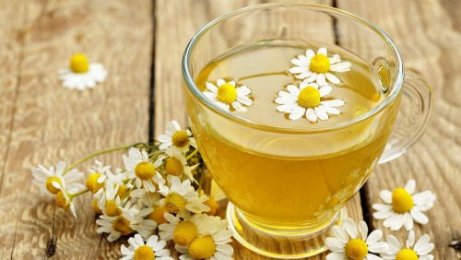Abortifacient Plants You Shouldn't Eat While Pregnant

Did you know that there are some plants that you shouldn’t eat while pregnant? Usually, they’re known as abortifacient plants, since they can cause serious damage to your child’s health, even triggering a miscarriage. We’ll tell you everything you need to know in this article.
Abortifacient plants to avoid during pregnancy
Plants known as abortifacient have within their compounds some active ingredients that can favor the onset of contractions, thus triggering an abortion, especially during the first months of pregnancy.
For this reason, pregnant women shouldn’t usually take medicinal plants, unless they have a prescription and medical advice. Before consuming natural teas, consult your doctor about it.
Find out: What Can Cause Discharge During Pregnancy and How To Treat It
Abortifacient plants prohibited in pregnancy

Take note of the plants that could cause health problems for your baby and even yourself so you can avoid them during pregnancy. Below, we’ll tell you which abortifacient plants you should avoid eating:
- Wormwood
- Verbena
- Rue
- Boldo
- Yarrow
- Licorice
- Sage
- Tansy
- Farfara
- Mint pennyroyal
- Arnica
- Santa Maria Herb
- Ginkgo biloba
Regular consumption of infusions made with these plants can cause some complications, especially during the first trimester of pregnancy, although we also don’t recommend consumption in the second and third trimesters. Among the possible problems we have:
- Increased blood flow in the uterus
- Provocation of uterine contractions
- Induction of premature labor or abortion
- Detrimental effects on the health of the fetus
- Bleeding, which can lead to the loss of the fetus
- Vomiting and nausea
- Diarrhea
- Numbness
As we mentioned at the beginning of this article, consult your doctor before ingesting any of these medicinal plants. Remember that, during pregnancy, you have to pay special attention to your diet to take care of your health and your baby’s.
Drinking teas with abortifacient plants and risk of miscarriage

Many women drink tea made from any of the plants mentioned above in an attempt to minimize caffeine intake, which we know shouldn’t exceed 300 mg daily. Remember that caffeine is also present in tea, some soft drinks, and chocolate.
Read also: Is Caffeine Consumption Safe during Pregnancy?
Now, does this information mean that if you’ve had wormwood tea you have a high risk of a miscarriage? As a general rule, the risk of miscarriage increases with regular and habitual consumption. This means that if you drank tea from one of these abortifacient plants before knowing that they could be harmful, there’s no danger.
When in doubt, we recommend that you go to your doctor to get their opinion and remain calm, for your health and that of your baby. No one can guide you better than a specialist.
Beneficial drinks during pregnancy

We’ve already seen which teas aren’t recommended during pregnancy, now we’ll give you some options to replace coffee or black tea for breakfast:
- Chamomile: its digestive properties can help you if you’re having digestive issues. Also, it can help you fight insomnia.
- Red tea: this doesn’t contain theine (caffeine), for this reason it’s usually recommended during pregnancy. Its antihistamine properties make it a good option for pregnant women who suffer from allergies.
- Tila tea: famous for its calming properties, it can help you reduce anxiety and sleep peacefully.
- Ginger: Ginger tea is often used to relieve stomach issues such as nausea and vomiting.
- Raspberry Leaves: Grandmothers often recommend raspberry leaf tea when you’re close to labor, due to its purported benefits for toning the uterine muscles.
Note: Although these infusions don’t usually cause problems in pregnant women, before drinking them, you should consult your doctor.
If you’re pregnant, you have to be especially careful with your diet and hydration. Pay attention to everything you eat to avoid damaging your health or that of your baby.
All cited sources were thoroughly reviewed by our team to ensure their quality, reliability, currency, and validity. The bibliography of this article was considered reliable and of academic or scientific accuracy.
- Bermúdez Matus, K. L., Delgado Soto, A. A., & Valle García, G. A. (2019). Análisis microbiológico de fitofármacos : Llantén, cola de caballo, quiebra piedra para problemas urinarios, comercializados en farmacias botánicas de la ciudad de León [Tesis de Pregrado, Universidad Nacional Autónoma de Nicaragua, León]. http://riul.unanleon.edu.ni:8080/jspui/handle/123456789/7677
- Bruno, L. O., Simoes, R. S., De Jesus Simoes, M., Girão, M. J .B. C., & Grundmann, O. (2018). Pregnancy and herbal medicines: An unnecessary risk for women’s health-A narrative review. Phytotherapy Research, 32(5), 796-810. https://pubmed.ncbi.nlm.nih.gov/29417644/
- De Araújo, C. R., Santiago, F. G., Peixoto, M. I., de Oliveira, J. O., & Coutinho, M. S. (2016). Use of Medicinal Plants with Teratogenic and Abortive Effects by Pregnant Women in a City in Northeastern Brazil. RBGO Gynecology and Obstetrics, 38(3), 127-131. https://www.thieme-connect.com/products/ejournals/html/10.1055/s-0036-1580714
- El-Gazar, A. A., Emad, A. M., Ragab, G. M., & Rasheed, D. M. (2022). Mentha pulegium L. (Pennyroyal, Lamiaceae) Extracts Impose Abortion or Fetal-Mediated Toxicity in Pregnant Rats; Evidenced by the Modulation of Pregnancy Hormones, MiR-520, MiR-146a, TIMP-1 and MMP-9 Protein Expressions, Inflammatory State, Certain Related Signaling Pathways, and Metabolite Profiling via UPLC-ESI-TOF-MS. Toxins, 14(5), 347. https://www.ncbi.nlm.nih.gov/pmc/articles/PMC9147109/
- Illamola, S. M., Amaeze, O. U., Krepkova, L. V., Birnbaum, A. K., Karanam, A., Job, K. M., Bortnikova, V. V., Sherwin, C. M. T., & Enioutina, E. Y. (2020). Use of Herbal Medicine by Pregnant Women: What Physicians Need to Know. Frontiers in Pharmacology, 10, 1-16. https://www.frontiersin.org/journals/pharmacology/articles/10.3389/fphar.2019.01483/full
- Khatib, S., Sobeh, M., Faraloni, C., & Bouissane, L. (2023). Tanacetum species: Bridging empirical knowledge, phytochemistry, nutritional value, health benefits and clinical evidence. Frontiers in Pharmacology, 14, 1-46. https://www.ncbi.nlm.nih.gov/pmc/articles/PMC10157496/
- Kubica, P., Szopa, A., Dominiak, J., Luczkiewicz, M., & Ekiert, H. (2020). Verbena officinalis (Common Vervain) – A Review on the Investigations of This Medicinally Important Plant Species. Planta Medica, 86(17), 1241-1257. https://www.thieme-connect.com/products/ejournals/html/10.1055/a-1232-5758
- Lewicka, A., Szymański, Ł., Rusiecka, K., Kucza, A., Jakubczyk, A., Zdanowski, R., & Lewicki, S. (2019). Supplementation of Plants with Immunomodulatory Properties during Pregnancy and Lactation-Maternal and Offspring Health Effects. Nutrients, 11(8), 1-21. https://www.mdpi.com/2072-6643/11/8/1958
- Márquez Carrasco, Á. M., Rico Neto, M., Leo Rodríguez, M. R. (2017). Seguridad de la toma de infusiones herbales en el embarazo: manzanilla, valeriana, tila, té y menta-poleo. Revista Enfermería Docente, 109, 77-81. https://www.huvv.es/profesionales/revista-enfermeria-docente/seguridad-de-la-toma-de-infusiones-herbales-en-el-embarazo-
- Organización Mundial de la Salud. (9 de agosto de 2023). Restricting caffeine intake during pregnancy. Consultado el 21 de agosto de 2024. https://who.int/tools/elena/interventions/caffeine-pregnancy
- Sarecka-Hujar, B., & Szulc-Musioł, B. (2022). Herbal Medicines-Are They Effective and Safe during Pregnancy? Pharmaceutics, 14(1), 1-27. https://www.mdpi.com/1999-4923/14/1/171
- Sharifzadeh, F., Kashanian, M., Koohpayehzadeh, J., Rezaian, F., Sheikhansari, N., & Eshraghi, N. (2018). A comparison between the effects of ginger, pyridoxine (vitamin B6) and placebo for the treatment of the first trimester nausea and vomiting of pregnancy (NVP). The Journal of Maternal-Fetal & Neonatal Medicine, 31(19), 2509-2514. https://www.tandfonline.com/doi/full/10.1080/14767058.2017.1344965
- Universidad de Texas (s.f.). Herbs to Avoid During Pregnancy. Consultado el 21 de agosto de 2024. https://www.utep.edu/herbal-safety/populations/herbs-to-avoid-during-pregnancy.html
- WebMD. (2020). Black Tea – Uses, Side Effects, and More. Therapeutic Research Faculty. Consultado el 3 de abril de 2024. https://www.webmd.com/vitamins/ai/ingredientmono-997/black-tea
- WebMD. (2020). Herb Robert – Uses, Side Effects, and More. Therapeutic Research Faculty. Consultado el 3 de abril de 2024. https://www.webmd.com/vitamins/ai/ingredientmono-24/herb-robert
- WebMD. (2020). Horsetail – Uses, Side Effects, and More. Therapeutic Research Faculty. Consultado el 3 de abril de 2024. https://www.webmd.com/vitamins/ai/ingredientmono-843/horsetail
- WebMD. (2020). Rosemary – Uses, Side Effects, and More. Therapeutic Research Faculty. Consultado el 3 de abril de 2024. https://www.webmd.com/vitamins/ai/ingredientmono-154/rosemary
- WebMD. (2020). Uva Ursi – Uses, Side Effects, and More. Therapeutic Research Faculty. Consultado el 3 de abril de 2024. https://www.webmd.com/vitamins/ai/ingredientmono-350/uva-ursi
This text is provided for informational purposes only and does not replace consultation with a professional. If in doubt, consult your specialist.








